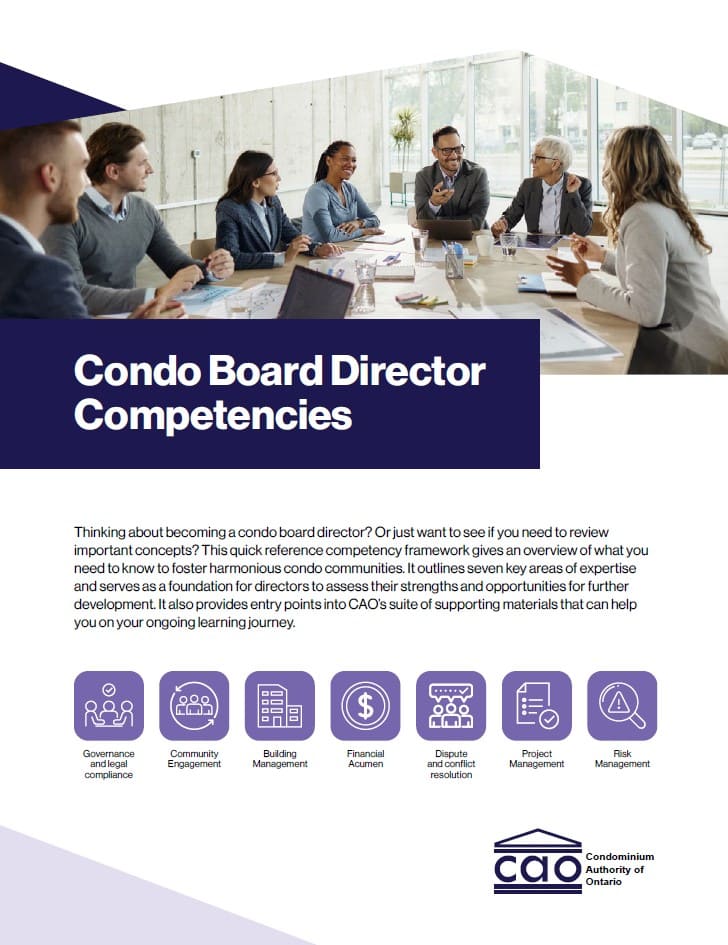How Boards Work
Condo Board Director Competencies
Thinking about becoming a condo board director? Or just want to see if you need to review important concepts? This quick reference competency framework gives an overview of what you need to know to foster harmonious condo communities. It outlines seven key areas of expertise and serves as a foundation for directors to assess their strengths and opportunities for further development. It also provides entry points into CAO’s suite of supporting materials that can help you on your ongoing learning journey.
Governance and legal compliance
Directors should understand legal frameworks, their own board responsibilities and governance best practices. They must adhere to by-laws, manage risks, foster transparency, maintain positive owner relations and stay informed about industry developments. Directors must also ensure that condo community members comply with the law, seek professional advice when needed and implement effective escalation procedures for legal issues.
Good governance also means understanding board structure, conducting effective meetings, and focusing on relevant matters while maintaining accountability and transparency within the condominium community.
Community Engagement
Board directors should aim to create a cohesive and inclusive community by communicating openly and building relationships effectively. They should excel in facilitation, active listening, embracing diverse perspectives and encouraging participation in condo meetings. Effective community management also means promptly addressing concerns, acting on feedback and ensuring compliance with all legally required notices that owners must receive.
Building Management
Directors should oversee maintenance, operations and safety within their condominium building. They should understand their repair and maintenance obligations and ensure cost-effective and timely repairs. They should source appropriate contractors, suppliers and services while evaluating their performance and legal compliance throughout the procurement process.
Financial Acumen
Directors should understand financial statements and financial reporting. They should communicate effectively with auditors and accountants, whose advice is essential for proper financial oversight. Additionally, they should understand reserve funds and budgeting, ensuring that finances are reported accurately. Setting sustainable condo fees is crucial to ensuring long-term financial stability for the condo community.
Dispute and conflict resolution
Directors can resolve conflicts by actively listening, analyzing risks, and finding practical solutions that work best for their community. It’s important to implement proactive measures that strengthen communication and transparency. Mediation techniques and negotiation skills are essential for addressing conflicts early on.
Dispute and conflict resolution involves managing issues proactively and understanding escalation channels such as the Condominium Authority Tribunal, Condominium Management Regulatory Authority, Ontario Human Rights Commission, and Ontario Superior Court of Justice.
Project Management
Directors should be able to identify, organize, and execute initiatives in a timely manner while staying within project scopes and budgets. One way is by ensuring that board meetings are inclusive and constructive. Another important aspect is selecting, onboarding and monitoring vendors effectively during projects. Lastly, boards should oversee managers and maintain open communication with them, as they can provide crucial assistance in moving projects forward.
Risk Management
Risk management involves analyzing issues and developing practical solutions. One of the most important risks that directors must manage is long-term structural integrity, which they can control by ensuring healthy reserve funds and proper financial management. Another important aspect is compliance with legislation, which can be achieved by staying up to date on sector laws and best practices, as well as ensuring proper transparency and communication within their condo community.
Risk assessment involves evaluating the severity and likelihood of risks like these and prioritizing solutions using tools like risk severity matrices, while also assessing the effectiveness of mitigation strategies. Emergency planning applies risk management principles to develop and test emergency responses for more acute issues.
